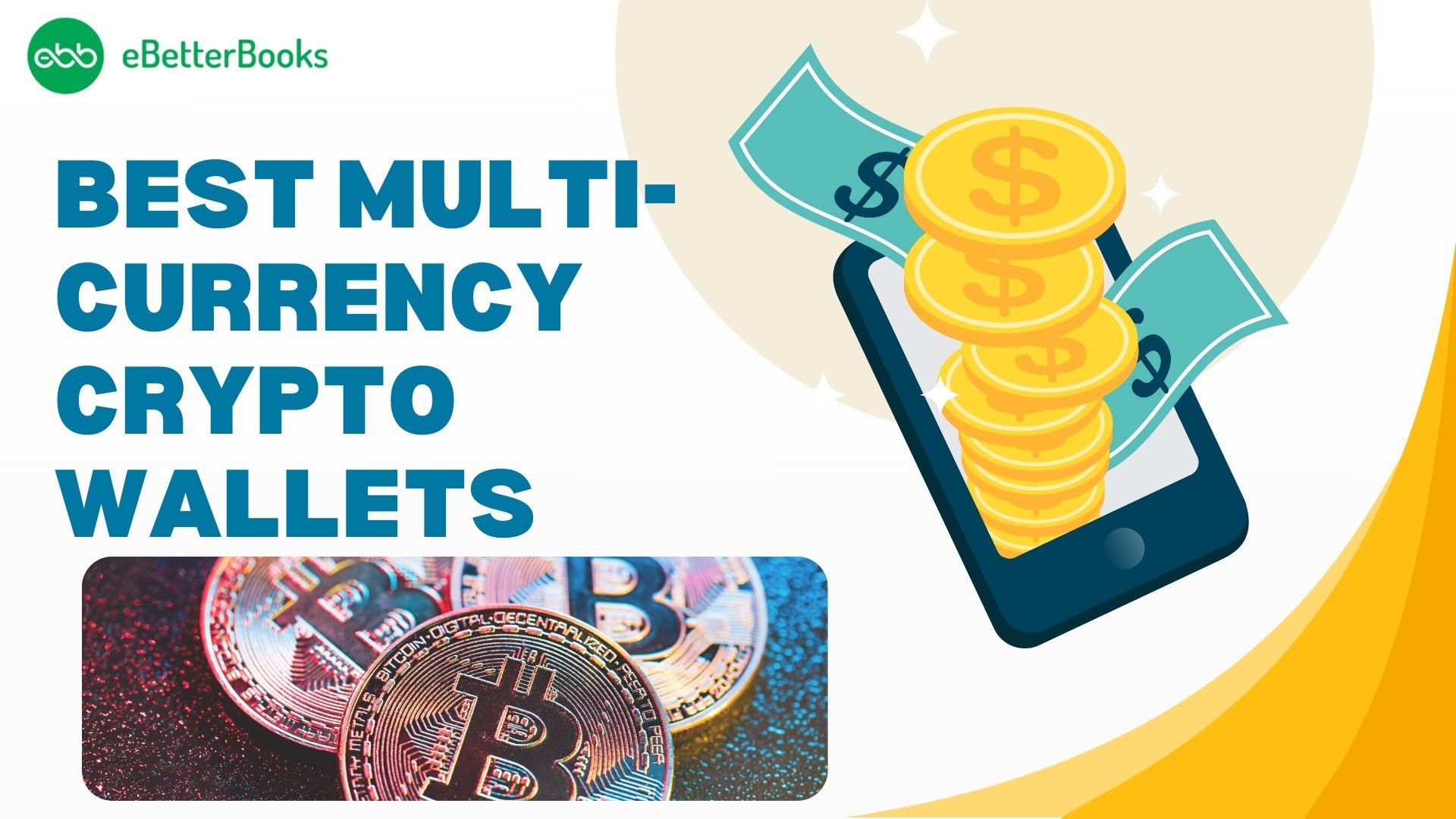Various multi-currency crypto wallets are available on the market, such as Trust Wallet, Atomic Wallet, and Ledger Nano X, which offer numerous features on a single platform. The best Multi-Currency Wallets offer features such as security level, compatibility, Convenience, Built-In Exchange, and ease of use.
Table (TLDR)
| S.no | Name of Multi – Currency Wallet | Best Known & Value for |
| 1 | Trust Wallet | Best Multi – Currency Wallet because of its integration with decentralized finance (DeFi). |
| 2 | Coinbase Wallet | Best Multi – Currency Wallet because of its security features and staking rewards |
| 3 | Exodus Wallet | Best Multi – Currency Wallet because of its easy and interactive interface. |
| 4 | ELLIPAL Titan Wallet | Best Multi – Currency Wallet because of its100% air-grapped features and DeFi integration. |
| 5 | Tangem Wallet | Best Multi – Currency Wallet because of its card -style wallet structure and NFC capabilities. |
| 6 | Trezor Model T Wallet | Best Multi – Currency Wallet because of its open-source design and security features. |
| 7 | Atomic Wallet | Best Multi – Currency Wallet because of its easy interface and high – security feature. |
| 8 | Coinomi Wallet | Best Multi – Currency Wallet because it supports multiple cryptocurrencies and privacy. |
| 9 | Ledger Nano X Wallet | Best Multi – Currency Wallet because of its high security and user-friendly interface. |
| 10 | CoolWallet Pro Wallet | Best Multi – Currency Wallet because of its muti–chain and NFT trading support. |
Top 10 Best Multi-Currency Crypto Wallets in 2025
| Wallet Name | Suitable for | Company Name | Supported Assets | Wallet Type | Security Features | Price |
| Trust Wallet | Beginners and Advanced users | DApps Platform, Inc. Now, owned by : Binance | Bitcoin, Polygon, Kava, Solana, XRP, Cosmos, USDC , and many more | Software | ◼AES encryption ◼Biometric authentication ◼12-word secret recovery phrase ◼Regular audits by third-party security firms ◼ongoing security monitoring to identify risks proactively ◼In-app notifications keep users up to date on security issues | $0 |
| Coinbase Wallet | New and seasoned users | Coinbase Bermuda Technologies Limited (CBTL) | Bitcoin, Dogecoin, Litecoin, Ethereum, and Solana and many more. | Software | ◼12 – word recovery phrase ◼2 -factor authentication ◼Password protected ◼Multi-approvals withdrawals | $0 |
| Exodus Wallet | Beginners | Exodus Movement, Inc. | Bitcoin Cash, SOL, DOGE, ETH,ADA, and many more. | Software | ◼Offline storage ◼Encrypted meta data ◼Biometric authentication | $0 |
| ELLIPAL Titan Wallet | Security conscious users | ELLIPAL | Ethereum Classic (ETC), Bitcoin, ERC20, TRC20, and many more | Hardware | ◼CC EAL5+ Certified ◼PIN & Passphrase Protection ◼Secret Secondary Wallet ◼Anti-tamper construction Offline upgrade | $99.-$169 |
| Tangem Wallet | Extremely beginner | Tangem AG | Ethereum, Bitcoin, Ethereum Classic, and EthereumPoW and many more | Hardware | ◼Non-extractable private key. ◼Access code protection ◼EAL6+ security standard ◼Biometric security ◼True Random Number Generator | $54.90-$69.90 |
| Trezor Model T Wallet | Beginners users Advanced users | SatoshiLabs | Ethereum Classic, Dogecoin, XRP, Tezos, and many more. | Hardware | ◼Passphrase protection ◼Customizable PIN protection ◼Secure offline storage | $129 |
| Atomic Wallet | For users looking for a secure and feature-rich wallet | Atomic Protocol Systems OU | Bitcoin, Ethereum, Solana, Polkadot, Avalanche and many more. | Software | ◼Full control over your funds. ◼Private keys are encrypted. ◼Uses a licensed EU payment provider. ◼No one can block your funds. | $0 |
| Coinomi Wallet | For those looking to manage multi-asset wallets with privacy-centric features. | Coinomi Limited | Bitcoin (BTC), Ethereum (ETH),Ethereum Classic (ETC), Ripple (XRP), Litecoin (LTC), and many more. | Software | ◼No IP Association ◼Hierarchical Deterministic (HD) ◼No Identity Linking ◼No KYC Bureaucracy to Access Your Funds ◼No Transactions Tracking | $0 |
| Ledger Nano X Wallet | Beginners | Ledger | Ethereum Classic (ETC), XRP, Tether, Litecoin, and many more. | Hardware | ◼PIN protected ◼Secret Recovery Phrase ◼Built with a CC EAL5+ certified secure chip | $149 |
| CoolWallet Pro Wallet | Users who want a slim, portable wallet. | CoolWallet | Ethereum Classic (ETC), Bitcoin, XRP, BUSD, and many more. | Hardware | ◼EAL6+ secure element ◼CE and RoHS certified | $149 |
1. Trust Wallet
( Wallet Type – Software )
DApps Platform, Inc., which is owned by Binance, is a California-based company founded in 2017. The company has developed a cryptocurrency wallet called Trust Wallet. Trust Wallet is a well-known mobile wallet recognized for its support of multiple assets and its seamless integration with Binance.
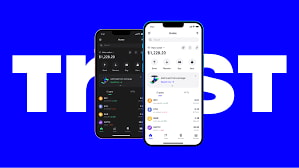
Wallet Details
| Wallet Issuer | DApps Platform, Inc. Now, owned by : Binance |
| Asset supported | 10M+ |
| Price | $0 ( free download) |
| How to apply for the wallet? | Trustwallet.com |
| Multi-platform compatibility | iOS Android Browser extension ( Brave, Opera, Chrome) |
| Addon Services | Staking Crypto Swapping Crypto |
| Backup and Recovery | 12-word secret recovery phrase |
| Best Suited | Beginners and Advanced users |
- Buy, store, send and receive crypto
- NFT management
- Staking and Earning interest
- DApp integration
- User-friendly interface
- Biometric authentication such as fingerprint or face recognition
- Non-custodial with encrypted private keys
- A 12-word secret recovery phrase
- Back up of recovery phrase to the cloud or manually
- Regular audits by third-party security firms
- Ongoing security monitoring to identify risks proactively.
- Real-time scam prevention to help users avoid phishing threats.
- Trust wallet is free to download and use.
- Transaction fees are applicable while transferring crypto.
- Variable fees are applicable based on different factors.
- No withdrawal fees.
No personal detail is required.
- Users can earn rewards from new projects using Trust Wallet Launchpool.
- Trust Wallet Token – used to unlock various benefits such as discounts on in-app cryptocurrencies purchases.
Pros & Cons
| Pros of Trust Wallet | Cons of Trust Wallet |
| Provides Built-in staking and DeFi access. | Offers limited advanced features to professional traders. |
| Free to download and use | No two-factor authentication |
| Offers a user-friendly interface. | Limited customer support |
Trust Wallet is perfect for mobile users seeking a privacy-focused, user-friendly wallet. However, its lack of desktop compatibility might limit its appeal to certain users.
2. Coinbase Wallet
( Wallet Type – Software )
Coinbase Wallet, developed by Coinbase, is a mobile wallet and browser that provides complete control over your assets. Coinbase Bermuda Technologies Limited (CBTL) is a subsidiary of Coinbase based in Bermuda. The Coinbase wallet is user-friendly, making it perfect for beginners, while also offering essential tools for experienced crypto traders.
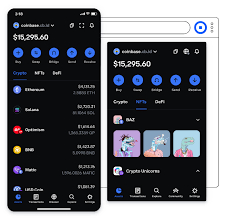
Wallet Details
| Wallet Issuer | Coinbase Bermuda Technologies Limited (CBTL) |
| Asset supported | 450,000+ |
| Price | $0 (free download) |
| How to apply for the wallet? | Coinbase.com |
| Multi-platform compatibility | Mobile – iOS / Android Web Browser |
| Addon Services | Stalking crypto |
| Backup and Recovery | 12 – word recovery phrase |
| Best Suited | New and seasoned users |
- Partnerships with hardware wallet.
- Stores 1000+ digital assets.
- Allow users to trade, buy and earn rewards.
- User friendly design
- Store and Manage NFTs
- Access to dApps
- 2 -factor authentication
- Multi-approvals withdrawals
- 12 – word recovery phrase
- Password protected
- Coinbase wallet is free to download and use.
- Coinbase charges withdrawal fees based on type of withdrawal.
- Coinbase charges deposit fees based on type of deposit.
- Coinbase offers a subscription service of around $300.
- Coinbase charges trading fees based on type of trade.
- Legal Full Name
- Government Photo ID
- Email Address
- Phone number
- Date of Birth
- Social Security Number ( SSN ) – optional
- Proof of funds – for large transactions
- Quick access to Coinbase Exchange and trading
- Current platforms cover a range of crypto tokens, ERC20 tokens, and NFTs.
- Integrated browser for the exploration of various DApps and DeFi platforms
Pros & Cons
| Pros of Trust Wallet | Cons of Trust Wallet |
| Sync directly to Coinbase exchange. | Fees applicable for coin swap |
| Preconfigured blockchains | Not an open source software. |
| Supports a wide range of cryptocurrencies. | No desktop application. |
Coinbase Wallet is a great option for users due to its intuitive interface and strong security features. Its integration with the Coinbase exchange and support for various cryptocurrencies make it an excellent choice for both beginners and experienced traders.
3. Exodus Wallet
( Wallet Type – Software )
Exodus Movement, Inc. is a fintech company that offers a multi-currency wallet and asset management solution called “Exodus.” It allows users to securely store, organize, and exchange cryptocurrencies on various platforms, including PCs, mobile devices, and browsers. It supports popular cryptocurrencies such as Bitcoin and Ethereum.
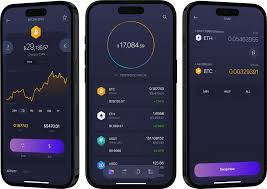
Wallet Details
| Wallet Issuer | Exodus Movement, Inc. |
| Asset supported | 1000+ assets |
| Price | $0 ( free download) |
| How to apply for the wallet? | Exodus.com |
| Multi-platform compatibility | Desktop – Mac & Windows Mobile App – iOS & Android Browser Extension |
| Addon Services | Staking & Swapping |
| Backup and Recovery | 12- word secret recovery phase |
| Best Suited | Beginners |
- Support over 260 cryptocurrencies
- In wallet – exchange option
- Available for both desktop app for Windows, Linux and Mac
- Live tracking option on desktop app and website.
- 24/7 customer support
- User-friendly interface
- Offline storage
- Encrypted meta data
- Biometric authentication
- Exodus wallet is free to download and use.
- Exchange fees are changed while using the built -in exchange option.
- Transaction fees are charged by the cryptocurrency network.
- No personal detail is required.
- The user has to tell the use of an installation program without having to enter personal information.
- The backup key phrase for data storage.
- The object for installing an application on a PC or a smartphone.
- Earn staking rewards from Cosmos, Tezos, Solanna, Ontology, Algorand, VeChain and Cardona.
- Earn reward on the first $2,500 of eligible crypto.
Pros & Cons
| Pros of Exodus Wallet | Cons of Exodus Wallet |
| Support multiple currencies and is freely available. | Offers limited advanced security features to the users. |
| Offers a user friendly interface to its users. | Has limited mobile app functionality. |
| Offers 24/7 customer support. | Charges higher fees for in-wallet transactions. |
Exodus is an excellent option for users, as its built-in exchange enables convenient trading and management of their cryptocurrency portfolio, helping them avoid high fees and the reliance on a centralized exchange.
4. ELLIPAL Titan Wallet
( Wallet Type – Software )
ELLIPAL specializes in developing secure and user-friendly air-gapped hardware wallets. The ELLIPAL Titan is crafted to enhance security while offering a smooth experience for cryptocurrency users.
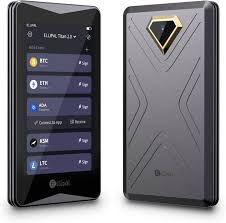
Wallet Details
| Wallet Issuer | ELLIPAL |
| Asset supported | 10,000+ |
| Price | $99.00-$169.00 |
| How to apply for the wallet? | Ellipal.com |
| Multi-platform compatibility | iOS Android |
| Addon Services | Swap crypto Stake crypto Portfolio managing |
| Backup and Recovery | 24-word mnemonic phrase (seed phrase) |
| Best Suited | Looking for high security and wants to manage the portfolio offline. |
- Recover your cryptos with mnemonics and passphrases
- Support for multi-asset management and DeFi integrations.
- ELLIPAL supports MetaMask and WalletConnect.
- Secret Secondary Wallet
- Anti-tamper construction
- CC EAL5+ Certified
- PIN & Passphrase Protection
- ELLIPAL Titan Mini Cold Wallet – $99.00
- ELLIPAL Titan 2.0 Cold Wallet – $169.00
No personal detail is required.
Users can earn rewards (Smart Rewards and Super Rewards by SMART Cash.
Pros & Cons
| Pros of Wallet | Cons of Wallet |
| Supports a wide range of cryptocurrencies. | Its reliance on a mobile app may not suit users who prefer desktop interfaces. |
| 100% air-grapped cold wallet. | Limited third-party integrations |
| User-friendly interface | The wallet is quite expensive as compared to the other wallets available in the market. |
The ELLIPAL Titan is a high-security wallet ideal for users with large cryptocurrency portfolios. Its air-gapped design and user-friendly interface make it a great choice for Ethereum Classic holders.
5. Tangem Wallet
(Wallet Type – Hardware)
Tangem AG is a technology company headquartered in Switzerland. The company specializes in designing and developing secure microchips, smart cards, and other embedded solutions, and it offers smart banknotes for token cards and cryptocurrency wallets.
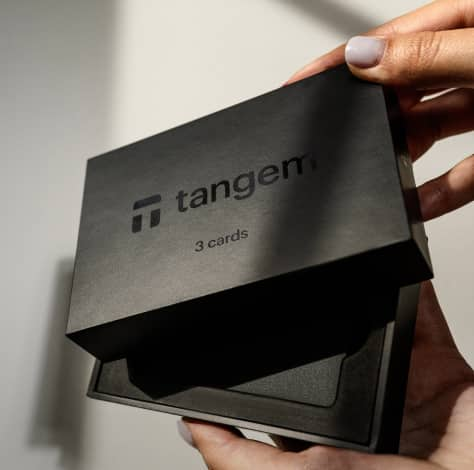
Wallet Details
| Wallet Issuer | Tangem AG |
| Asset supported | 1000+ |
| Price | $54.90 – $69.90 |
| How to apply for the wallet? | Tangem.com |
| Multi-platform compatibility | iOSAndroid |
| Addon Services | Swap crypto |
| Backup and Recovery | 12 or 24 word seed phrase Backup cards |
| Best Suited | Extremely beginner |
- Live tracking of cryptocurrencies.
- Users can store, buy, earn and transfer coins and tokens.
- User-friendly interface
- Slim like a bank card
- Full control over private keys.
- Access code protection
- The chip generates a non-extractable private key.
- EAL6+ security standard
- Biometric security
- True Random Number Generator
- The wallet price changes from $54.90 – $69.90.
- Network transaction fees are applicable based on the type of transaction.
No personal detail is required.
- Offers maximum resistance to dust, water and extreme temperatures.
- Tangem app verifies the authenticity of the chip and firmware.
- 25 – year warranty
- Users can earn a 10% discount through referral programs.
Pros & Cons
| Pros of Tangem Wallet | Cons of Tangem Wallet |
| User-friendly interface | Can only be used with iOS and Android phones. |
| Supports 1000s of tokens and coins | Doesn’t have built-in integrations for DeFi or DApps |
| Online support available 24/7. | Users can only back up their wallet |
The Tangem Wallet features an intuitive card design that improves accessibility. It includes NFC capabilities, supports a wide range of cryptocurrencies, and enhances security with hidden private key generation.
6. Trezor Model T Wallet
(Wallet Type – Hardware)
SatoshiLabs is a technology company located in Prague, Czech Republic, specializing in developing hardware and software for cryptocurrencies. The company is renowned for Trezor, a leading hardware wallet for cryptocurrency storage.
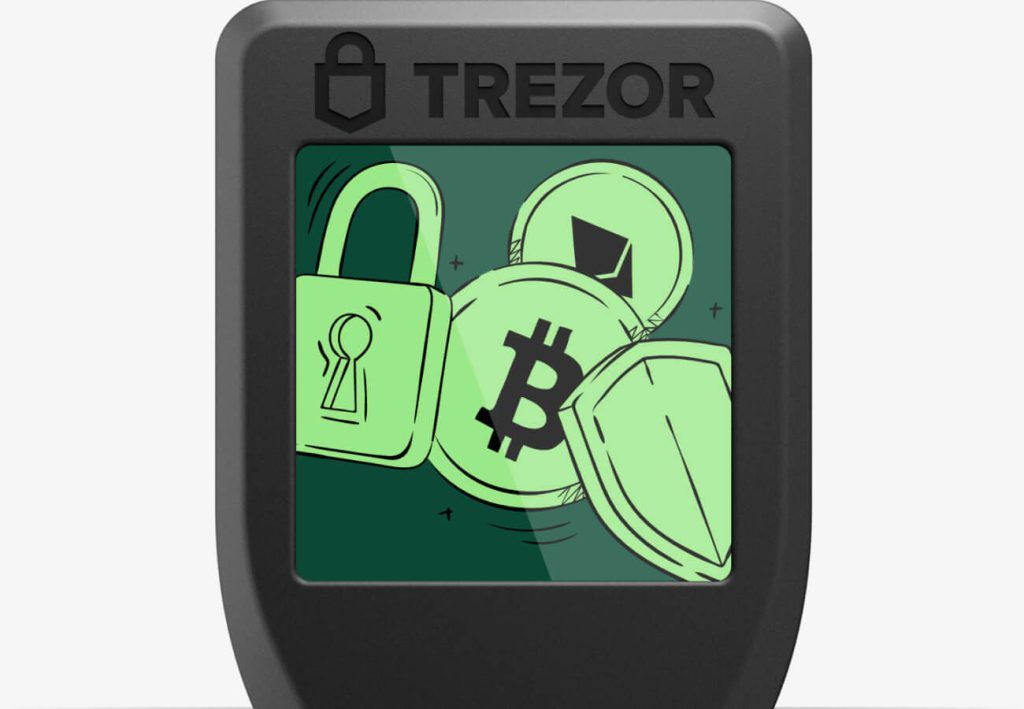
Wallet Details
| Wallet Issuer | SatoshiLabs |
| Asset supported | 14 assets |
| Price | $129 |
| How to apply for the wallet? | Trezor.io |
| Multi-platform compatibility | macOS Windox Android Linux |
| Addon Services | Stake crypto |
| Backup and Recovery | 12-word Standard Backup |
| Best Suited | Beginners users Advanced users |
- Integration with multiple third -party wallets
- Wide compatibility
- View, send, receive and stake your coins through Trezor Suite
- 1.54” LCD screen.
- USB – connectivity
- Open-source design
- PIN protection ( Customizable )
- Passphrase protection
- Customizable PIN protection
- Trezor Model T : $129
- Transaction fees are also applicable based on the type of transactions.
No personal detail is required.
- Open source for transparency.
- Users get regular updates regarding the wallet.
Pros & Cons
| Pros of Trezor Model T Wallet | Cons of Trezor Model T Wallet |
| Supports a wide range of cryptocurrencies. | No iOS support |
| Has a user- friendly interface along with touchscreen for intuitive navigation. | The wallet is quite expensive as compared to the other wallets available in the market. |
| Installation is very quick and easy | Only select cryptocurrencies can be purchased with fiat. |
The Trezor Model T is a top choice for secure cryptocurrency storage due to its strong security, user-friendly touchscreen, and wide compatibility. Although it is pricier than other hardware wallets, its premium features make it worth the investment.
7. Atomic Wallet
(Wallet Type – Software)
Atomic Protocol Systems OU, based in Estonia, offers Atomic Wallet, a non-custodial cryptocurrency wallet that gives users full control of their private keys and funds.
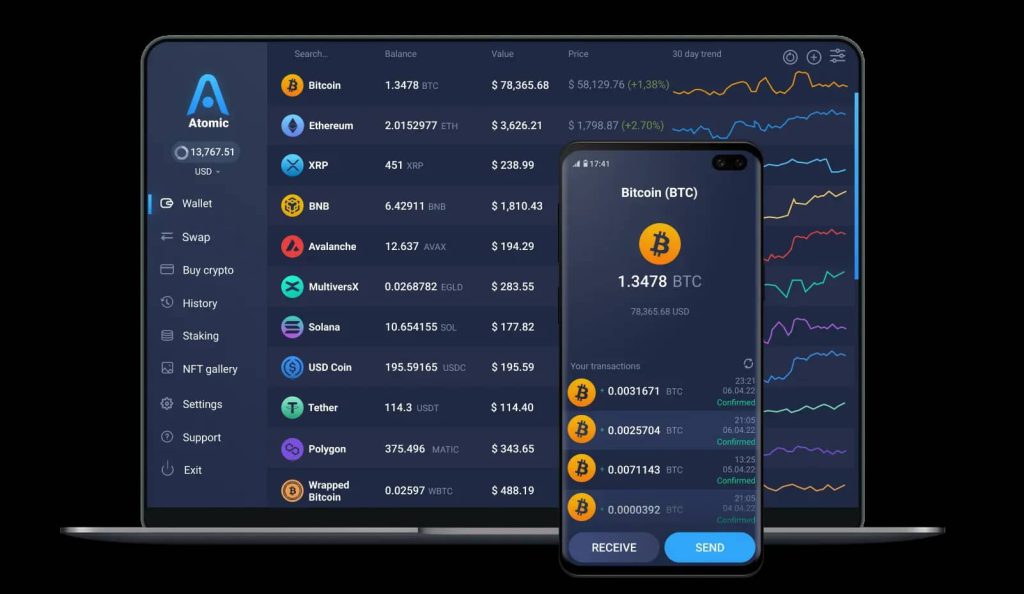
Wallet Details
| Wallet Issuer | Atomic Protocol Systems OU |
| Asset supported | 1000+ |
| Price | $0 ( free download) |
| How to apply for the wallet? | Atomicwallet.io |
| Multi-platform compatibility | Desktop Browser Extension |
| Addon Services | Stake cryptocurrencies Swap cryptocurrencies |
| Backup and Recovery | 12 -word recovery phase |
| Best Suited | For users looking for a secure and feature-rich wallet |
- Compatible with various operating systems.
- Allow users to stake crypto on blockchains.
- Instant swap with cashback
- Fast purchases with an average transaction time of 15-30 minutes.
- Full control over your funds.
- Private keys are encrypted.
- Uses a licensed EU payment provider.
- No one can block your funds.
- Transactions fees are applicable on cryptocurrencies purchases.
- Charges 2% fee for all fiat-to crypto purchases.
- Fees are applicable on Atomic swap.
- Atomic Wallet is free to download and use.
- Fees are applicable on peer-to-peer trade or in-wallet currency trade.
- No personal detail is required.
- No KYC
- No accounts
- No verification
- 24*7 live support
- Provides different levels of membership to the users.
- Supports 20+ local currencies over 100 countries.
- Offers cashback on wallet’s swap service.
Pros & Cons
| Pros of Atomic Wallet | Cons of Atomic Wallet |
| Swap over 500 crypto-based assets | Limited number of coins support atomic swaps |
| User friendly interface on both desktop and mobile app. | Hardware integration is not supported. |
| Offers built-in exchange feature to its users | Various fees are applicable for transactions |
Atomic Wallet offers strong functionality and security. However, users may find the reliance on network fees and the lack of fiat integration limiting.
8. Coinomi Wallet
(Wallet Type – Software)
The Coinomi Wallet is a secure software wallet, allowing to hold multiple types of cryptocurrencies at same time. It is easy to use and accessible for both desktop and mobile user.
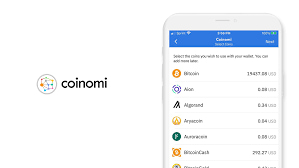
Wallet Details
| Wallet Issuer | Coinomi Limited |
| Asset supported | 1000+ |
| Price | $0 (free download) |
| How to apply for the wallet? | Coinomi.com |
| Multi-platform compatibility | Desktop App Mobile App |
| Addon Services | Staking Crypto Swapping Crypto |
| Backup and Recovery | 24 – word recovery phase |
| Best Suited | For those looking to manage multi-asset wallets with privacy-centric features. |
- Wide range of cryptocurrencies
- Private Key management
- Multi-Coin & Multi-Asset
- Cross-chain payments
- Custom and Dynamic Fees
- No IP Association
- Hierarchical Deterministic (HD)
- No Identity Linking
- No KYC Bureaucracy to Access Your Funds
- No Transactions Tracking
- Coinomi wallet is free to download and use.
- Third party program fees are applicable.
- Variable blockchain network fees are applicable
- Email address is required for registration.
- A strong password to secure a wallet.
- No KYC, IP associated, transaction linking, identity linking
- Cold staking for some assets.
- Integrated exchange functionality.
Pros & Cons
| Pros of Coinomi Wallet | Cons of Coinomi Wallet |
| Wide range of cryptocurrencies. | Not open source software |
| Advanced security measure | No Fiat support. |
| Various built-in features for individuals. | Not integrated with the hardware wallet. |
The Coinomi wallet is user-friendly, secure, and supports many cryptocurrencies, making it an ideal choice for desktop and mobile users.
9. Ledger Nano X Wallet
(Wallet Type – Hardware)
Ledger is a French company specializing in cryptocurrency wallets, holding about 20% of the hardware wallet market. Its product lineup includes the Ledger Nano S, Nano X, Flex, and Stax.
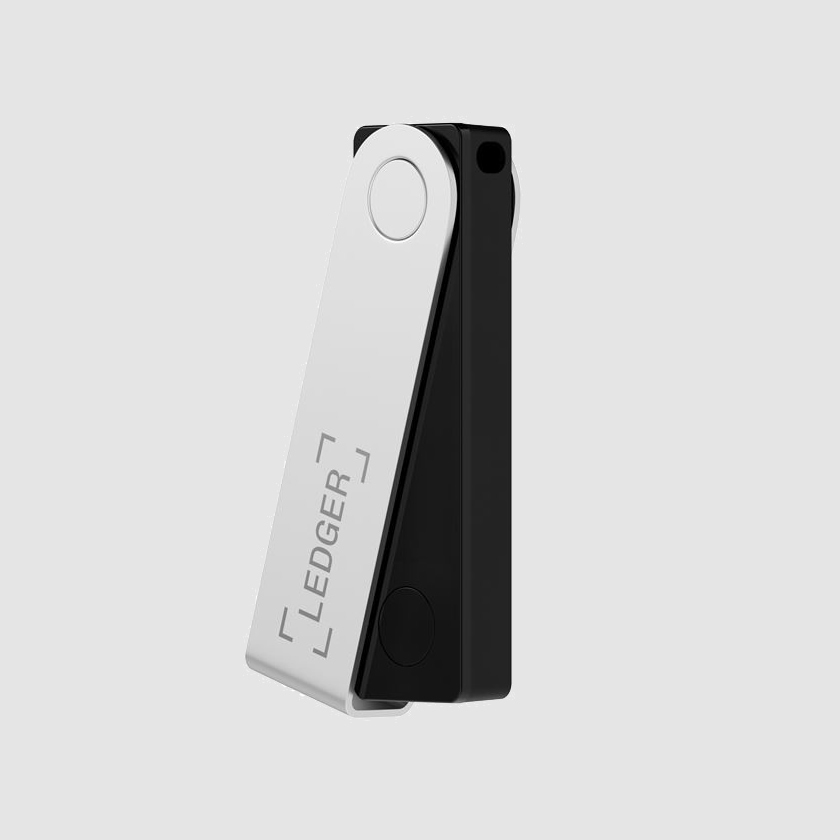
Wallet Details
| Wallet Issuer | Ledger |
| Asset supported | 5500+ |
| Price | $149 |
| How to apply for the wallet? | Ledger.com |
| Multi-platform compatibility | Windows – 10/11macOS iOSAndroid 10+ |
| Addon Services | Swapping crypto Staking crypto |
| Backup and Recovery | 24-word recovery phrase |
| Best Suited | Beginners |
- User-friendly interface
- Bluetooth or USB – connectivity
- Backup and restore
- 1.09” Monochrome OLED display
- Support multiple cryptocurrencies
- Support NFTs
- Has a Ledger Live app to manage and stake digital assets.
- Secret Recovery Phrase (24-word recovery phrase)
- PIN protected ( 4- 8 digit PIN code )
- Built with a CC EAL5+ certified secure chip
- Ledger Nano X – $149
- Offers an optional subscription for Ledger recovery.
- 24-word recovery phrase to recover the assets.
- No personal information is required.
- PIN code to unlock the device.
- No email address and password.
- Users can earn multiple rewards by staking assets.
- Available in 6 different colors.
- Different ledger wallets for business, startups and developers.
- User Ledger Live App to track the rewards.
Pros & Cons
| Pros of Ledger Nano X Wallet | Cons of Ledger Nano X Wallet |
| User-friendly and easy to access anytime, anywhere. | Has a non-replaceable battery. |
| Supports thousands of count and tokens | Is not fully open – source |
| Bluetooth connectivity is available | Not the cheapest hardware wallet in the market. |
The Ledger Nano X is a secure hardware wallet with Bluetooth connectivity that supports multiple cryptocurrencies, providing a reliable solution for investors to safeguard their digital assets.
10. CoolWallet Pro Titan Wallet
(Wallet Type – Hardware)
CoolWallet, the developer of CoolWallet Pro, focuses on creating innovative and portable hardware wallets for secure cryptocurrency storage.
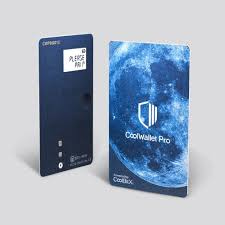
Wallet Details
| Wallet Issuer | CoolWallet |
| Asset supported | 12000 coins and tokens including |
| Price | $149 |
| How to apply for the wallet? | CoolWallet.io |
| Multi-platform compatibility | Android 6+ iPhone 5/iOS 12.1+ |
| Addon Services | 12/18/24 recovery phrase |
| Backup and Recovery | Stake crypto |
| Best Suited | Ideal for on-the-go users seeking a slim, portable wallet. |
- DeFi integrations
- Encrypted Bluetooth
- Compact, credit card-like design
- Multi-chain support, swap, and futures trading
- EAL6+ secure element
- CE and RoHS certified -MNCC- CCAF22LP0650T3
- The price of the wallet is $149.00.
- Transactional fees are also applicable depending on the transaction type.
- No personal detail is required.
- No KYC
- Rewards for staking supported coins.
- Frequent firmware updates for new features and coin support.
Pros & Cons
| Pros of CoolWallet Pro Wallet | Cons of CoolWallet Pro Wallet |
| DeFi and staking integration. | Limited display size for navigation. |
| NFT trading support (via OpenSea and Rarible) | Battery dependency for some functions. |
| Supports wide range of crypto assets | No live customer support |
CoolWallet, the developer of CoolWallet Pro, focuses on creating innovative and portable hardware wallets for secure cryptocurrency storage.
Methodology
Selecting the most suitable multi-currency crypto wallet for 2025 depends on security mechanisms and interface simplicity, asset cross-platform support, staking functions, and decentralized application connectivity.
For example:
◻Ledger Nano X
The Ledger Nano X offers premium security and functionality. This device protects your private keys against external threats because it uses a secure chip certified at CC EAL5+ standard with PIN code authentication for protection against both digital breaches and physical theft. The device supports operation with 5,500+ cryptocurrencies, including Bitcoin, Ethereum, Binance Coin, and other supported digital currencies. Bluetooth connectivity powers Ledger Nano X because it enables users to access their devices through the Ledger Live app.
◻Atomic Wallet
Atomic Wallet is a powerful desktop and mobile wallet that caters to multi-currency users with ease. The wallet supports and covers over 500 coins and tokens. The wallet system provides staking support for Cardano (ADA), Solana (SOL), and numerous other supported coins. Transactions between crypto assets become possible while users stay within the application window. Using Atomic Wallet as a hot wallet implies that users will access lower security levels than hardware wallets.
Your selection of the ideal multi-currency wallet should depend on the specific features that matter most to you, including security measures with simple user interaction and capabilities for staking and direct application integration. Clusters of users select hardware wallets from Ledger Nano X and Trezor Model T when they pursue the highest security features, although many use software wallets Trust Wallet and Exodus for accessible usability.
What are Multi-Currency Crypto Wallets?
A multi-currency crypto wallet is a cryptocurrency wallet that stores more than one type of digital money simultaneously.
When crypto wallets first appeared, they often functioned with a single cryptocurrency type, such as Bitcoin or Ethereum. As the crypto world advanced, engineers created wallets that store multiple financial assets.
Users can store various cryptocurrencies, including well-known coins Bitcoin, Ethereum, Litecoin, BSV, Solana, and tokens in their multi-currency crypto wallet.
How Multi-Currency Crypto Wallets Work?
Multi-currency wallets help users store and handle many types of cryptocurrencies directly from their main user interface. Having multiple currencies in a single wallet proves useful for traders and people looking to invest in many types of coins.
The Technology Behind Wallets
This new wallet technology creates safe ways to keep multiple cryptocurrencies together while making them easy to manage. Digital wallets need essential tools to create and save unique cryptographic keys for every supported cryptocurrency. The advanced version of cryptography, known as a private key, helps users securely access their cryptocurrency distribution. A private key requires special credentials to unlock it, as defined by the wallet software.
Users choose between local storage on the device and remote server storage options, which are typical for web-based wallets. Local storage wallets are preferred for security because they shield users from online hacking dangers. The system depends on the user to maintain device integrity and security in order to function.
Basic security becomes stronger when multi-currency wallets add improved features that benefit their users. Multi-currency wallets include automatic exchange capabilities between cryptocurrencies, support for blockchain apps, interest-earning accounts, and lending services.
Due to their linked technology features, multi-currency wallets have become necessary options for new and seasoned crypto users. These wallets secure many types of digital assets while helping users manage and enhance their cryptocurrency holdings. As cryptocurrency markets grow, the technology that powers multi-currency wallets will develop further to provide users with better security and expanded features.
Transaction Process
When you make payments with your multi-currency wallet, you follow some steps to protect the transfer of money between different currencies.
Users need to create their wallet accounts by going through registration and safeguarding their private keys, as keys offer direct wallet access. After setting up their wallet, the user can add multiple currencies to it by either buying from the platform or transferring existing funds.
The user starts the transaction flow when they select to move money in their wallet’s supported currencies. The user types the recipient’s wallet ID and payment amount into the system. After finding the needed transaction fee, the wallet program shows the combined amount for user verification. Each network sets its transaction fees, and these rates depend on the blockchain used and the present network traffic levels.
After user approval, the wallet uses their private key to sign the transaction, which confirms that they authorized the transaction. The blockchain network uses validating nodes to analyze the signed transaction after it broadcasts to the network. The validation process ensures that the transaction is accurate and that the sender has enough money in their account.
When the network verifies a transaction, it adds it as a block to the blockchain. The system permanently stores all transactions without allowing anyone to modify them, so users enjoy guaranteed security and visibility.
The recipient’s wallet software automatically sees the incoming transaction and modifies their account balance. Decoding and depositing individual transactions into blocks on the blockchain system depends on the blockchain type and network traffic. This usually takes a few minutes to several hours.
Uses of Multi-Currency Crypto Wallets
- Single Platform for Multiple Assets: Users can easily handle multiple cryptocurrencies in one wallet instead of juggling separate wallets for each.
- Reduced Transaction Costs: Some wallets offer in-app conversions or swaps, which can reduce fees compared to transferring assets between different wallets.
- Custom Features: Some wallets offer enhanced usability features such as portfolio tracking, staking options, or built-in exchanges.
- Built-In Exchange Services: Some wallets offer in-app crypto swaps, eliminating the need to use external exchanges.
- Cross-Platform Availability: Some wallets offer enhanced usability features such as portfolio tracking, staking options, or built-in exchanges.
How to Choose a Multi-Currency Crypto Wallet?
When selecting a multi-currency crypto wallet, you need to evaluate its security features and practical benefits for your transactions.
Additional features like asset exchanges and staking features should also be considered. Choose providers and wallets smartly, and for safety, consider hardware wallets that grant private key management power.
- Private Key Management: Make sure your wallet lets you keep your private keys under your authority and encrypts your data securely. Instead of submitting to custodial storage solutions, select wallets that manage private keys independently.
- Two-Factor Authentication (2FA) and Encryption: To enhance your digital security, choose wallets with 2FA security features. Two-factor authentication provides better security protection. Pick a crypto wallet that uses strong security encryption standards.
- Hardware Wallet Integration: Determine if adding a hardware wallet will create your most secure crypto storage system.
- User Interface: A beginner should pick a wallet that shows data simply and lets you navigate easily. A user-friendly interface becomes vital when you don’t know much about crypto.
- In-App Exchange: A few wallets enable you to convert one cryptocurrency into another straight from their app. So, always pick those wallets that offer an on-app exchange feature.
- Staking and DeFi Integration: To generate passive earnings view if the wallet system permits staking across different crypto assets. You can handle DeFi platforms from inside these specific wallets.
- Supported Currencies: Ensure your chosen wallet handles every cryptocurrency you need to store right now and expect to use it in the future. Users can find wallets that handle only big coins plus support alternative cryptocurrencies and tokens, including ERC-20 and BEP-20.
- Reputation and Customer Support: Research important details about the wallet provider and test their support services by experience. Investigate past security issues when you evaluate wallets.
- Backup and Recovery: Find out if you can restore your wallet from seed phrases or recovery keys and how to protect it in case of a problem.
- Transaction Features: Check the wallet for its ability to read QR codes, show your past transactions, and display real-time currency rates.
- Compatibility: Choose a wallet that works with the digital device and operating system you use, either mobile, desktop, or browser extension.
Advantages of Multi-Currency Crypto Wallets
- Streamlined Portfolio Management: Users can view and track their entire crypto portfolio in one place, making it easier to monitor performance.
- Wide Range of Supported Assets: Multi – currency crypto wallets often support major coins (e.g., Bitcoin, Ethereum) and altcoins, as well as tokens from various blockchains (e.g., ERC-20, BEP-20).
- DeFi and DApp Support: Many wallets integrate with decentralized applications, allowing you to participate in DeFi, lending, or staking activities directly.
- Global Use Case: If you transact internationally or trade with different coins, a multi-currency wallet simplifies access and usage without the need for conversions or additional tools.
- NFT and Token Support: Many multi-currency wallets also support NFTs and tokens, which enhances their functionality.
Challenges or Limitation of Multi-Currency Crypto Wallets
- Complexity in managing different networks: As we know that each cryptocurrency functions on a distinct blockchain network, which can create confusion when sending or receiving funds, especially for beginners.
- Potential for higher fees: Some multi-currency wallets might impose higher transaction fees for certain less popular cryptocurrencies.
- Reduced privacy: The privacy provided by the wallet depends on the wallet provider as storing multiple cryptocurrencies in one place could potentially expose more details about your overall crypto holdings.
Conclusion
When choosing the best multi-cryptocurrency wallet for 2025, your decision should reflect your priorities, whether security, ease of use, or advanced trading features. Wallets such as Coinbase and Trust Wallet provide user-friendly interfaces and extensive support for various cryptocurrencies.
On the other hand, hardware wallets like the Ledger Nano offer unparalleled security for long-term storage. By selecting a wallet that strikes a balance between convenience and protection, you can effectively manage multiple cryptocurrencies, engage with DeFi applications, and stake your crypto assets with confidence.
FAQs
What is the Most Secure Crypto Wallet?
The most secure crypto wallet is Ledger and Trezor. They both are highly recommended by the users and are an excellent option for investors seeking secure storage.
Where is the Safest Place to Keep Crypto?
The safest way to store cryptocurrency is by using a hardware wallet, which is a physical device that allows users to have complete control over their private keys while keeping them stored offline.
Should I Put My Crypto in a Wallet?
Storing your cryptocurrency in a self-custody wallet is the most secure option. In the past, investors have lost crypto held in exchanges due to hacks and bankruptcies.

